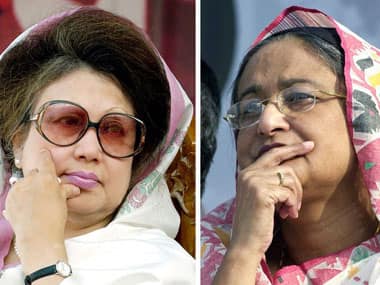Just three weeks later Bangladesh is scheduled to have its 10th general election. But is it really so? Instead, the country is in the grip of a political stalemate and the specter of imposition of national emergency looms large. There is also a strong possibility of the military stepping in to prevent anarchy, in a repeat of a similar situation in 2007 when Bangladesh’s two czarinas — Prime Minister Sheikh Hasina and Opposition leader and a two-time former Prime Minister Begum Khaleda Zia — had agreed to disagree on anything and everything, bringing all political discourse to a halt. [caption id=“attachment_1283865” align=“alignleft” width=“380”]  Begum Khaleda Zia and Begum Sheikh Hasina AFP[/caption] Increasingly, the situation in Bangladesh today is akin to the 2007 situation and anything drastic is possible, including a coup or a soft military-takeover as an interim measure. Much to Sheikh Hasina’s delight, Bangladesh’s Election Commission had scheduled general elections for 5 January to fulfill its constitutional obligation as a new government has to be in place by 24 January. Begum Zia expectedly threw a spanner in Hasina’s works – the two ladies cannot see eye to eye on any issue, anyway – and refused to participate in the elections. Hasina has tried every possible trick in her repertoire, including an offer of handing over the home ministry to Begum Zia’s Bangladesh National Party (BNP), but nothing has worked. The logjam in Bangladesh is keeping India worried for a host of reasons. One, India’s (Wo)Man Friday Sheikh Hasina is not being given any breather by her arch political foe Begum Zia, a known India-baiter and Pakistan sympathiser, thus pushing Bangladesh towards a situation of free-for-all political turmoil. Two, any instability in Bangladesh is bound to ring alarm bells in India as India shares its longest border (4100 kms) with Bangladesh. India, the world’s largest democracy and itself going through its own tailspin politically, is in a quandary. It cannot support an election which is boycotted by Bangladesh’s main opposition party, the BNP. India can also not remain unaffected if the ongoing political turmoil in Bangladesh reaches a flashpoint situation. For a country that has been ravaged by assassinations, military coups and natural disasters of crippling proportions, set against the background of historical backwardness, this by itself is an achievement. Add to this the fact that Bangladesh is a country of 160 million people, nestled inside India, neighbouring five crucial states which have historical linkages with Bangladesh, and it becomes clear why India’s stakes in the success of democracy in Bangladesh are so high. Credit must go to Sheikh Hasina’s government and personally to her for her stewardship of the Bangladesh state. She has overcome the most egregious personal tragedies at the hands of fanatics and conspirators to take them head on and provide justice to thousands like her who had suffered at the hands of the marauding Pakistani forces and their collaborators in 1971. She has shown the political courage to build a liberal, modern and progressive Muslim society which has few examples in the world. She has taken on the fundamentalists and the network of terrorist and insurgent groups and brought peace not only to her nation but also to the border with India and the sub-region. The country has made visible and impressive progress in the education, health, women’s empowerment, agriculture and rural development sectors. Several infrastructure projects have been launched, with the most impressive performance being in the power sector. As elections approach, this is the time for Hasina to re-establish her democratic credentials. She has been on record to say that she will never countenance another military intervention, that she will uphold the Constitution and that she is committed to holding free and fair elections. She has said she will step down if she loses. She has invited her main opponent Begum Khaleda Zia to join an all Party election time government, and offered to be flexible on portfolios and numbers. Unlike the BNP, which was born in the cantonment, Sheikh Hasina’s Awami League is a genuine political party with roots predating Bangladesh’s independence. Begum Khaleda Zia believes that she stands a whale of a chance to emerge victorious but is apprehensive of contesting elections under a dispensation led by Sheikh Hasina. Begum Zia’s stance betrays a ‘willing to wound but afraid to strike’ kind of an attitude. If Begum Zia is so self-confident, she should drop her inexplicable obduracy, call the Awami League’s bluff and participate in the forthcoming elections. This is the only legitimate way in which political parties across the world can hope to come to power, and this is the only way for peaceful transfer of power in democratic countries. If the BNP does so, this will give chance to the people of Bangladesh to exercise their right to franchise in a manner that they deserve. The logjam can be broken, and the ball rests in the BNP’s court. This is a time for both ladies to show maturity, respect Constitutional processes and recognize the supremacy of the people. But the writing on the wall points to a drastically different situation. Hoping for a breakthrough between the two Begums is not very different from hoping snowflakes to survive in an oven! The writer is a Firstpost columnist and a strategic analyst who tweets @Kishkindha.
The country is in the grip of a political stalemate and the specter of imposition of national emergency looms large.
Advertisement
End of Article
Written by Rajeev Sharma
Consulting Editor, Firstpost. Strategic analyst. Political commentator. Twitter handle @Kishkindha. see more


)

)
)
)
)
)
)
)
)



